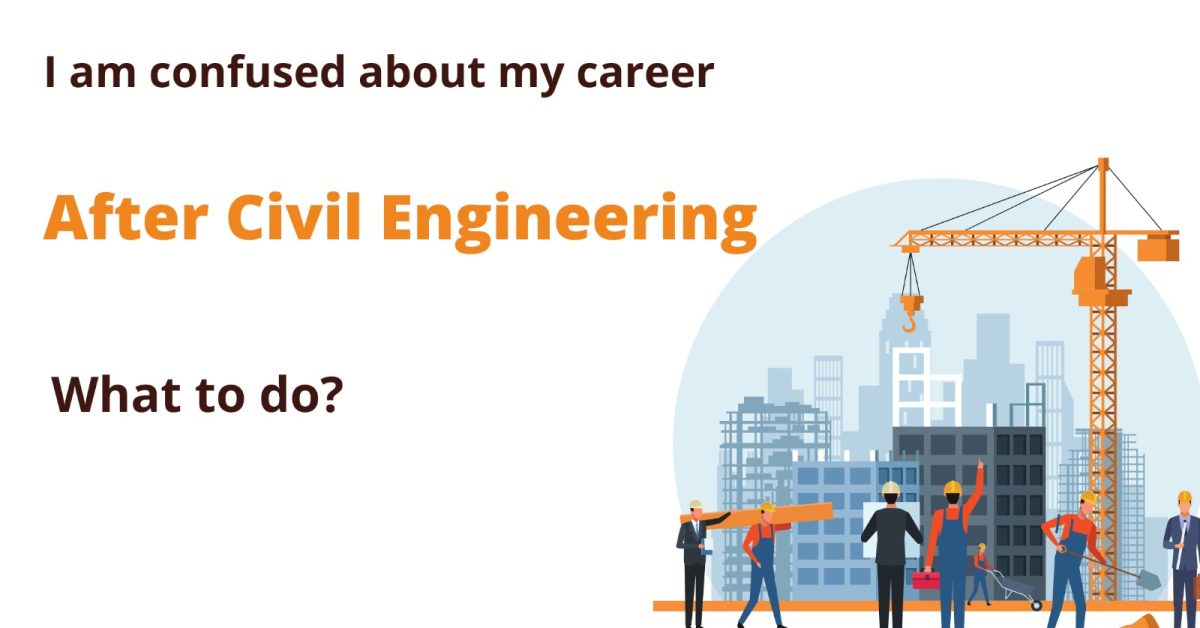When there are too many choices, we struggle to decide on a career. Understand, that you are not alone in being uncertain about what to do with your Civil engineering degree. Many of them are in similar boats as yours. Stress and anxiety can be built on by career confusion, but it is fixable with the correct assistance.
Expand on your research of the civil engineering degree
Buildings for public use are designed and constructed as part of civil engineering work. Roads, bridges, tunnels, and infrastructure are a few examples of these undertakings.
Civil engineers frequently split their time between factories and building sites in addition to working in multiple locations. The majority of civil engineers work full-time, but if you opt to choose to take up a career in this field, be ready to spare more time in a week than just the regular working hours.
Thus, the first step in eliminating confusion is to evaluate whether your values, interests, and pursuits coincide with your civil engineering degree.
Civil engineering degree employment prospects
- Ensuring that demand is in a growing stage for that industry is critical for any aspiring candidate looking for a job.
According to the Bureau of Labor Statistics, jobs provided by civil engineers will expand by five percent between 2022 and 2032 which is faster than the average for other industries. Moreover, India will alone need about 4 lakh civil engineers in the projection of the next 10 years. - Opportunities at the international level
Job opportunities for civil engineers are not just limited nationally because companies and consultants hire civil engineers internationally too. In addition, there are opportunities to work at home for various national and international companies in the public sector. The idea is that these positions come from employees changing jobs or jobs people have left behind due to retirement.
What tests should be prepared for future career advancement in civil engineering?
- UPSC (Union Public Service Commission) IES Examination.
- JEE Special Examination
- SSC JE Examination
- National AE/JE Examination
- RR BSSE Examination
- AFCAT
- SNAES Analysis
How does taking these tests help move up the ladder for you?
The tests above are government official tests. Accomplishing these exams with success could create opportunities for the public sector to contribute to national development by taking care of economically important functions, including Central Engineering Service, Indian Railways, Telecommunications, Power, Engineers and Defense Administration around
After passing this exam, the basic position available is Executive /Assistant Engineer and can extend up to the Chairman position.
A few of the highly reputed work areas are:
- Civil Service
As a civil service engineer, you are linked with both the public and the government. With your position and knowledge, you can implement and work on projects and policies and make people’s lives easier too. You can also execute the necessary adjustments to control traffic and enhance infrastructure
- Become a part of the Indian Armed Force
The Army, Navy and Air Force comprise the Indian Armed Forces. The nation’s highway borders and buildings can be designed by you as a part of a government-appointed military service civil Engineer. As an army representative, you can be responsible for constructing tunnels in times of conflict and placing them in strategic locations.
- Work in Public Sector Undertaking (PSU)
Working in a PSU has its unique advantages. This is because you get various benefits like medical facilities, retirement benefits and employment stability.
You can work on significant projects for the general public’s welfare in PSUs. Additionally, recent graduates who do well on the GATE exam have the opportunity to join the public sector.
- Build employment opportunities and live your dream
Almost in one or another career, everybody desires to work on their terms as a boss and few dream to hire people and build employment opportunities. By joining a private firm, you may grant contracts from the public and private sectors to construct homes and businesses. Also, one may sign government contracts to construct dams, bridges, and roadways. When you work for a private company or start your private firm, the possibilities for growth are endless.
Plan of Action
As a graduate/ fresher, the topmost goal should be to determine which area of civil engineering best fits you. These are all extremely profitable engineering sectors. Before choosing one of these areas, a SWOT analysis will help you ascertain your areas of strength, weakness, opportunities and threats and you can work on each of them to choose your field.
As a beginner, you can also work as a
- Construction engineer,
- Materials engineer,
- Field Service Engineer,
- Engineering project manager,
- Building Engineer,
- Fire Engineer,
- Structural engineer,
- Transportation engineer,
- Environmental engineer,
- City planner, or urban development engineer.
A computer-savvy tech job suitable for Civil Engineers
If you are a civil engineer and a computer-friendly person who is fond of designs and drawing then one of the suitable career choices is that of a:
CAD Technician
One of the best professions to pursue following civil engineering is CAD technician, also referred to as draughtsperson. These experts create project blueprints and technical drawings using computer-aided design (CAD) software. They support the planning and project management process for goods and components used in the engineering, manufacturing, and construction sectors. This way being an engineer, you will also get an option of having a hybrid off-field and on-field work as CAD technicians usually work from offices.
Conclusion
Since civilizations began the civil engineering profession has existed. From the construction of huts and muddy paths, the work of civil engineers has made way to construction such as bridges, dams, canals, motorways, palaces, magnificent monuments, and much more. The expertise needed by civil engineers has also evolved significantly over time.
Today’s civil engineers are expected to possess in-depth knowledge and useful abilities that they can use throughout their civil engineering careers. Civil engineering is one of the engineering specialities that has gained the most popularity. After civil engineering, there are countless, extremely fulfilling career options. Hence, leave the confusion behind of what can be done after holding a degree and take a step forward to learn, re-learn and grow.




